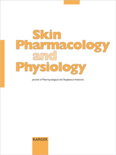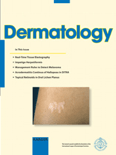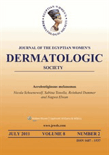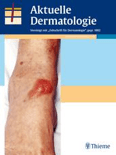
AUSTRALASIAN JOURNAL OF DERMATOLOGY
Scope & Guideline
Empowering professionals with cutting-edge dermatological research.
Introduction
Aims and Scopes
- Clinical Dermatology and Therapeutics:
The journal focuses on clinical studies and trials that evaluate the efficacy and safety of dermatological treatments, including the use of biologics, systemic therapies, and topical agents for various skin conditions. - Public Health and Epidemiology:
Research addressing the epidemiology of skin diseases, including prevalence, risk factors, and the impact of skin conditions on public health, particularly in diverse populations within Australasia. - Dermatopathology and Diagnostics:
Investigations into the histological and molecular aspects of skin diseases, enhancing diagnostic accuracy and understanding of disease mechanisms. - Innovative Technologies and Treatments:
The AJD publishes studies exploring new technologies in dermatology such as artificial intelligence for diagnosis, teledermatology, and novel therapeutic approaches to skin conditions. - Patient-Centered Care and Quality of Life:
The journal emphasizes research that evaluates the psychosocial impact of skin diseases and treatment adherence, aiming to improve patient outcomes and quality of life. - Cultural and Indigenous Health Perspectives:
Research that considers the unique dermatological needs and experiences of Indigenous populations and culturally diverse communities in Australasia.
Trending and Emerging
- Biologics and Targeted Therapies:
An increasing number of studies focus on the efficacy and safety of biologic agents and targeted therapies for chronic skin diseases, reflecting advancements in treatment options for conditions like psoriasis and atopic dermatitis. - Teledermatology and Digital Health:
Research on teledermatology and digital health solutions has expanded, particularly in the context of improving access to care during the COVID-19 pandemic, demonstrating the potential for remote consultations and monitoring. - Mental Health and Dermatology:
There is a growing trend towards exploring the relationship between skin conditions and mental health, emphasizing the psychosocial impact of dermatological diseases and the importance of holistic patient care. - Diversity in Dermatology:
Emerging research is increasingly addressing the representation and unique dermatological needs of diverse populations, including Indigenous communities, thereby promoting health equity in dermatological care. - Artificial Intelligence in Dermatology:
The application of artificial intelligence in diagnosing skin conditions and improving clinical outcomes is gaining traction, with studies exploring its potential to enhance diagnostic accuracy and treatment efficacy.
Declining or Waning
- Traditional Dermatological Practices:
There has been a noticeable decrease in publications focusing on traditional dermatological practices and treatments, as the field moves towards evidence-based and innovative therapies. - General Dermatology Reviews:
The frequency of broad review articles covering general dermatology topics has declined, with a shift towards more specialized and focused research. - Invasive Surgical Techniques:
Research related to invasive surgical techniques, such as excisional surgeries and traditional skin grafting, has seen a decrease as minimally invasive and non-invasive techniques gain preference. - Aging Population Studies:
While still relevant, there has been a waning focus on dermatological issues specifically related to aging populations, possibly overshadowed by more immediate concerns such as chronic inflammatory conditions. - Cosmetic Dermatology:
Publications in the realm of cosmetic dermatology have become less frequent, indicating a potential shift in research priorities towards medical dermatology and treatment of chronic conditions.
Similar Journals

SKIN PHARMACOLOGY AND PHYSIOLOGY
Bridging Pharmacology and Physiology for Skin WellnessSKIN PHARMACOLOGY AND PHYSIOLOGY is a leading peer-reviewed journal published by KARGER, based in Switzerland, that focuses on the intricate interplay between skin pharmacology and physiology. With its ISSN 1660-5527 and E-ISSN 1660-5535, the journal spans a rich history of publication since 1988, presenting groundbreaking research and discoveries in the fields of dermatology, pharmacology, and physiology. As evidenced by its 2023 quartile rankings, which include Q2 in Dermatology and Q2 in Medicine (miscellaneous), this journal is highly regarded, ranking in the 83rd percentile for dermatology in Scopus, reflecting its significant impact on the scientific community. Researchers, professionals, and students alike will find valuable insights in this publication, which aims to disseminate knowledge and foster innovations that enhance the understanding of skin-related health. The open access policies provide wider accessibility to relevant findings and developments, making it an essential resource for anyone dedicated to advancing the field.

ARCHIVES OF DERMATOLOGICAL RESEARCH
Championing Excellence in Skin Care ResearchArchives of Dermatological Research is a premier journal dedicated to the rapidly evolving field of dermatology, published by Springer. With a distinguished history dating back to 1971 and indexed in the top quartiles (Q1 in Dermatology and Q2 in Medicine, 2023), this journal serves as a vital resource for researchers, clinicians, and students alike. It publishes innovative findings, critical reviews, and comprehensive studies that advance our understanding of dermatological conditions and treatments. The journal's commitment to disseminating high-quality research in a field crucial to public health emphasizes the importance of advancing knowledge in skin science and therapy. For those looking to explore significant advancements in dermatology, Archives of Dermatological Research offers an invaluable platform for scholarly discourse and knowledge exchange, though it is not an Open Access journal. Based in Germany, this publication attracts a global audience and remains at the forefront of dermatological research until its anticipated converged years reaching 2024.

Dermatology Practical & Conceptual
Fostering multidisciplinary dialogue for skin health advancements.Dermatology Practical & Conceptual is a prominent open-access journal dedicated to advancing the field of dermatology through the dissemination of cutting-edge research and practical insights. Published by MATTIOLI 1885, this peer-reviewed journal has been committed to open access since 2015, ensuring that valuable information is readily available to researchers, healthcare professionals, and students worldwide. With a focus on innovative and practical approaches in dermatology, as well as its intersections with genetics, molecular biology, and oncology, the journal has established a strong academic presence, achieving a Q2 ranking in Dermatology and notable positions in related fields for 2023. Although its Scopus rankings indicate room for improvement in certain areas, such as genetics and molecular biology, the journal's commitment to quality and accessibility is evident in its engagement with contemporary research trends. The editors invite submissions that address practical challenges and novel methodologies, fostering a multidisciplinary dialogue that enhances dermatological practice and research. The journal operates from its base in Fidenza, Italy, and as it looks toward converged years from 2019 to 2024, it aims to further strengthen its influence and contribute significantly to the dermatological landscape.

Turkderm-Turkish Archives of Dermatology and Venerology
Empowering Dermatology with Unrestricted KnowledgeTurkderm - Turkish Archives of Dermatology and Venerology, published by GALENOS PUBL HOUSE, serves as a vital platform for the dissemination of innovative research and advancements in the fields of dermatology and venerology. With an Open Access policy implemented since 2002, this journal aims to provide free and unrestricted access to significant findings, ensuring that vital information reaches a global audience. Based in Turkey, the journal has positioned itself as an important resource for professionals, researchers, and students alike, despite currently being categorized in Q4 of both Dermatology and Infectious Diseases as per the 2023 metrics. Although it faces competition in the rankings, with a Scopus standing of #131 in Dermatology and #331 in Infectious Diseases, its dedication to advancing knowledge in these critical health areas is unwavering. The journal continually invites original research, reviews, and case studies that enhance clinical practices and foster understanding in the dermatological community.

JOURNAL OF THE AMERICAN ACADEMY OF DERMATOLOGY
Exploring innovative solutions for skin health challenges.JOURNAL OF THE AMERICAN ACADEMY OF DERMATOLOGY, published by Mosby-Elsevier, stands at the forefront of dermatological research and education. With an impressive impact factor and categorized as Q1 in Dermatology, this journal has established itself as a pivotal resource for healthcare professionals and researchers in the field. Since its inception in 1979, it has provided a platform for high-quality peer-reviewed articles, contributing significantly to advancements in dermatological science and practice through 2024. The journal commands an honorable position, ranking #8 out of 142 in the Scopus database's medicine dermatology category, placing it in the 94th percentile among its peers. Readers can access a wealth of cutting-edge studies, case reports, and reviews that address a broad spectrum of topics, from clinical dermatology to emerging therapies. In addition, the journal's commitment to excellence ensures it remains an essential tool for students, clinicians, and researchers dedicated to improving skin health and furthering knowledge in dermatology.

DERMATOLOGY
Unveiling breakthroughs in dermatological research.DERMATOLOGY, an esteemed journal published by KARGER, is a vital resource in the field of dermatological research and clinical practice. Established in 1893, with its comprehensive coverage extending to 2024, this journal has earned its place as a leading publication, holding a prestigious Q1 quartile ranking in Dermatology and ranking 15th out of 142 in the Scopus Medicine - Dermatology category, reflecting its 89th percentile standing within the discipline. The journal aims to disseminate innovative research findings, critical reviews, and clinical studies that advance the understanding of skin disorders and their treatments. While primarily available through institutional subscriptions, DERMATOLOGY remains committed to enhancing accessibility and fostering international collaboration among researchers, professionals, and students in the dermatological community. Its rigorous peer-review process guarantees the highest quality of published works, making it an essential reference for those dedicated to advancing dermatological science and improving patient care.

CUTIS
Empowering research that transforms dermatological practice.CUTIS is a distinguished journal devoted to advancing the field of dermatology and related medical disciplines. Published by Quadrant HealthCom Inc, this journal has been a critical resource since its inception in 1970, traversing the landscape of skin health and medical practice through its engaging articles and research. With an ISSN of 0011-4162 and an E-ISSN of 2326-6929, CUTIS is indexed in Scopus, where it currently holds a rank of #101/142 in the Dermatology category, placing it in the 29th percentile, further affirming its relevance within the academic community. Although it is classified within the Q3 quartile in both Dermatology and Medicine (miscellaneous), CUTIS remains committed to publishing high-quality research that encompasses both innovative treatments and essential dermatological knowledge. The journal serves as an invaluable platform for researchers, practitioners, and students alike, providing critical insights and fostering discussions that enhance patient care and professional practice in the dermatology field.

Journal of Egyptian Womens Dermatological Society
Transforming Women's Health Through Dermatological ScholarshipThe Journal of Egyptian Women's Dermatological Society, published by Wolters Kluwer Medknow Publications, is an essential platform dedicated to advancing the field of dermatology through a valuable focus on women's health issues. Established to provide an open access outlet since 2019, this journal aims to disseminate research, case studies, and reviews that address the unique dermatological needs and concerns of women, particularly in the Egyptian context. Despite its current ranking in the Q4 category in dermatology and a Scopus rank of #117 out of 142 with a 17th percentile, the journal serves a critical role in fostering scholarly communication among researchers, clinicians, and academicians. With a commitment to promoting knowledge advancement and community engagement, this journal invites submissions that align with its objectives, specifically geared towards empirical research and innovative practices in dermatology impacting women's health.

AKTUELLE DERMATOLOGIE
Bridging Gaps in Dermatological Education and ResearchAKTUELLE DERMATOLOGIE is a distinguished journal in the field of Dermatology, published by GEORG THIEME VERLAG KG in Germany. With a commitment to advancing knowledge and practice in dermatological science, the journal has regularly featured research articles, reviews, and case studies since its inception in 1975 and continues to publish contributions through 2024. Despite being categorized in the lower quartile (Q4) of dermatology journals and holding a Scopus rank of #127 out of 142, it plays a pivotal role in disseminating valuable insights that support ongoing education and research in the discipline. The journal provides an essential platform for both seasoned professionals and budding researchers to share their findings, explore emerging trends, and discuss clinical practices, all while serving the needs of an evolving medical landscape. Access to its content may be restricted, but the journal remains a crucial reference for those invested in the future of dermatological research and patient care.

CLINICAL AND EXPERIMENTAL DERMATOLOGY
Pioneering Research for a Clearer Tomorrow.CLINICAL AND EXPERIMENTAL DERMATOLOGY is a prominent journal in the field of dermatology, published by Oxford University Press. With an ISSN of 0307-6938 and an E-ISSN of 1365-2230, this journal has been a vital resource for researchers and practitioners since its inception in 1976. Recognized as a Q2 journal within the category of dermatology for 2023, it holds a respectable position, ranking #54 among 142 journals in this discipline, placing it in the 62nd percentile on Scopus. The journal is dedicated to publishing high-quality research that spans clinical and experimental aspects of dermatological science, making it an essential source of knowledge for advancing understanding and treatment of skin disorders. Although it operates on a traditional subscription model without open access options, its contributions to the field are significant, influencing both clinical practices and academic research. Researchers, clinicians, and students alike will find vital insights and contemporary themes presented in its pages, supporting ongoing education and innovation in dermatology.